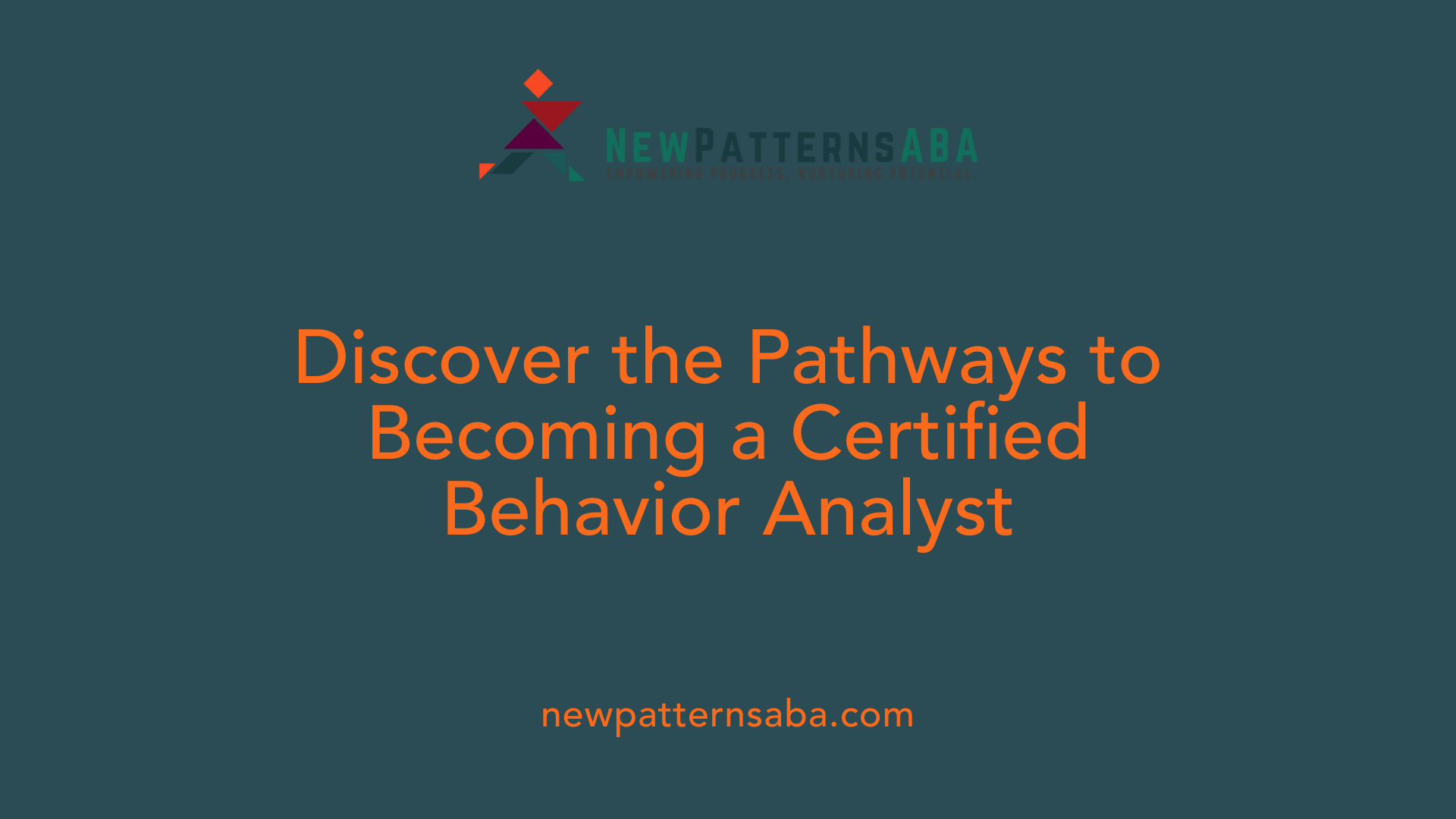Embarking on Your Path to Becoming a BCBA
Becoming a Board Certified Behavior Analyst (BCBA) is a structured process that requires education, supervised experience, examination, and ongoing professional development. This certification positions individuals as independent practitioners capable of providing behavior-analytic services across various settings. This article provides a comprehensive overview of the pathway to BCBA certification, including educational prerequisites, certification procedures, examination preparation, and career opportunities.
Understanding the Certification Landscape in Behavior Analysis
 The Behavior Analyst Certification Board (BACB) offers several certification levels, including the Registered Behavior Technician (RBT), Board Certified Assistant Behavior Analyst (BCaBA), and the highest credential, the Board Certified Behavior Analyst (BCBA). Each level serves different roles within the field and has specific educational and experience requirements.
The Behavior Analyst Certification Board (BACB) offers several certification levels, including the Registered Behavior Technician (RBT), Board Certified Assistant Behavior Analyst (BCaBA), and the highest credential, the Board Certified Behavior Analyst (BCBA). Each level serves different roles within the field and has specific educational and experience requirements.
The BCBA designation is highly regarded and recognized across various regions, reflecting a professional’s expertise and independence in providing behavior-analytic services. BCBAs are qualified to practice independently, supervise others, and contribute significantly to behavior analysis programs.
All BACB certifications are governed by strict accreditation standards. These standards are managed by the BACB, which ensures that training programs, coursework, and supervised fieldwork meet high-quality benchmarks. The programs are also accredited by the National Commission for Certifying Agencies (NCCA), which attests to their credibility and consistency.
What is the process to become a BCBA?
Becoming a BCBA involves several crucial steps. First, an individual must earn a master's degree from an accredited institution, usually in fields like psychology, education, or applied behavior analysis. The coursework must meet the BACB’s requirements, which can be verified through an approved program or a Verified Course Sequence (VCS) recognized by the BACB.
Next, candidates are required to complete supervised fieldwork hours, typically between 1,500 and 2,000 hours. This work must be overseen by a qualified BCBA and involve direct client interaction and behavior analysis activities.
Once coursework and supervised experience are completed, candidates apply to the BACB, submitting transcripts, supervision logs, and other documentation. Upon approval, the candidate schedules and takes the BCBA examination—an in-depth, four-hour multiple-choice test with 185 questions covering core content areas.
After passing the exam, the individual must obtain licensure if mandated by their state or region. To maintain the certification, BCBAs are required to participate in ongoing continuing education, typically completing 32 hours every two years, including ethics training.
This comprehensive process ensures that BCBAs are equipped with the requisite skills and knowledge to practice effectively and ethically in behavior analysis.
| Certification Level | Prerequisites | Supervised Experience | Exam Details | Recognition | Accreditation Standards |
|---|---|---|---|---|---|
| RBT | Basic training | None or minimal training | 75 questions, 1 hour | Entry-level | BACB standards |
| BCaBA | Bachelor’s degree + coursework | 1500 hours | 150 questions, 3 hours | Assistant role | BACB standards |
| BCBA | Master’s degree + coursework | 1500-2000 hours | 185 questions, 4 hours | Independent practice | BACB & NCCA standards |
This structure ensures clarity on the pathways and standards essential to professional development in behavior analysis.
Educational Requirements and Coursework for BCBA Certification

What are the educational requirements and coursework acceptable for BCBA certification?
To qualify for BCBA certification, candidates must meet specific educational prerequisites. This includes holding a master's degree from an accredited institution in fields such as behavior analysis, education, psychology, or related disciplines. However, more than just the degree itself, applicants must complete at least 270 graduate-level coursework hours that align with BACB standards.
The coursework must comprehensively cover essential areas outlined in the BACB Fourth Edition Task List. These areas include ethical conduct, principles of behavior analysis, research methodology, measurement and experimental design, and applied behavior analysis techniques. Each content area has prescribed hour requirements, ensuring candidates acquire a well-rounded understanding of behavior analysis.
Candidates can obtain their coursework through accredited university programs or Verified Course Sequences (VCS) recognized by BACB. The coursework must be completed within ten years of application for those following the pathways that require recent education. In addition to coursework, applicants are required to undertake supervised fieldwork, generally totaling around 2,000 hours, under the supervision of qualified professionals.
Passing the BCBA exam is a critical step, but maintaining certification also involves committing to ongoing continuing education and adhering to ethical standards set forth by the BACB. Together, these requirements establish a comprehensive foundation for professional practice in behavior analysis and ensure practitioners are well-versed in the necessary skills and knowledge.
Certification Pathways and Application Procedures
 The process to become a licensed BCBA involves several steps designed to ensure candidates meet the necessary standards of knowledge and experience. It all starts with reviewing the BCBA Handbook, which provides detailed information about eligibility requirements, coursework, and practicum expectations.
The process to become a licensed BCBA involves several steps designed to ensure candidates meet the necessary standards of knowledge and experience. It all starts with reviewing the BCBA Handbook, which provides detailed information about eligibility requirements, coursework, and practicum expectations.
First, applicants must confirm that they meet the prerequisites, which include holding a relevant bachelor's degree, completing graduate-level coursework in behavior analysis, and accruing supervised fieldwork hours. These hours typically range from 1,500 to 2,000 and must be documented thoroughly.
Once eligibility is established, candidates submit their application through their BACB account. This application requires detailed documentation, such as transcripts, verification of coursework from an accredited program or Verified Course Sequence, and records of supervised fieldwork. Additional proof of experience, publications, or mentorship may be necessary for those pursuing the BCBA-D designation.
After the application is reviewed and approved, the candidate receives an Authorization to Test (ATT) letter. The next step involves scheduling the exam, which is administered at Pearson VUE testing centers. Candidates select a convenient date within a two-year window and pay the exam fee, which varies but generally covers the cost of sitting for the exam.
The BCBA exam consists of 185 multiple-choice questions and must be completed in four hours. Effective preparation includes reviewing the BCBA Exam Content Outline, engaging in practice exams, and studying relevant coursework. The exam covers key areas like behavior analytic skills, ethical responsibilities, and behavior change procedures.
Upon passing the exam, individuals are awarded the BCBA certification. Maintaining this credential requires completing 32 hours of continuing education every two years, including ethics training, and adhering to BACB standards.
For those in jurisdictions requiring state licensure, a separate application may be necessary following certification. This allows practitioners to legally provide behavior-analytic services in their state.
Overall, the pathway emphasizes comprehensive preparation, accurate documentation, and ongoing professional development to uphold high standards in behavior analysis practice.
For additional details on the application process and preparing documentation, the BACB website offers resources and step-by-step guides. Referencing the 'BCBA certification application process' search query can provide further insights into each stage to streamline the journey toward certification.
Supervised Fieldwork and Experience Requirements
What are the fieldwork and supervised experience requirements for certification?
To qualify for BCBA certification, candidates are required to complete a specific amount of supervised fieldwork hours. Generally, this includes either 2,000 total hours of supervised experience or 1,500 concentrated hours, all completed under the guidance of a qualified BCBA supervisor. This hands-on experience helps candidates gain practical skills and apply behavioral analytic principles.
The activities involved in fieldwork are diverse. They range from direct client interventions, such as implementing behavior-analytic procedures, to broader tasks like designing behavior intervention plans and conducting assessments. Importantly, a minimum number of hours must be spent on unrestricted activities, which are central to professional practice, such as client management, data collection, and analysis.
Supervision guidelines specify that supervision must be conducted regularly and effectively. Candidates should receive at least one face-to-face supervision session per month, although the BACB recommends more frequent meetings when possible. Supervision hours should constitute at least 5% of the total hours worked each month, ensuring ongoing review and guidance. Both individual and group supervision formats are accepted, provided they follow BACB standards.
Regarding supervisor qualifications, only active BCBAs who meet experience and ethical standards can serve as supervisors. Proper documentation of supervision hours, activities, and content is essential and must adhere to BACB’s detailed record-keeping procedures. Documentation typically includes signed supervision logs, session summaries, and verification of activities performed.
Candidates can accumulate supervised hours over a period of up to five years, giving flexibility to plan and complete the required experience. Additionally, hours gained during employment as an RBT or BCaBA can count toward the fieldwork hours if the experience aligns with the BCBA requirements.
Overall, adherence to official BACB guidelines, thorough documentation, and ethical supervision practices are critical to successfully meeting these fieldwork and experience requirements for BCBA certification.
Examination Scheduling, Preparation, and Success Strategies
What details are involved in BCBA exam scheduling and preparation?
Scheduling the BCBA exam involves a few straightforward steps. Candidates must first log into their BACB account to access the Pearson VUE ProScheduler system. After their application is approved, they can choose from available test dates and locations that suit their schedule. Once a suitable slot is found, they select a testing center, pay the exam fee, and confirm the appointment details.
On exam day, candidates should arrive at the testing center at least 30 minutes early to account for check-in procedures. It’s essential to bring two valid forms of ID, including one government-issued photo ID with a signature. These might include a driver’s license or passport.
Preparation for the exam is a critical step. Candidates should review the exam content outline provided by the BACB, which covers areas such as behavior analytic skills, client-centered responsibilities, and behavior change strategies. Many find it helpful to use high-quality study materials like textbooks, official study guides, and practice tests available online or through training programs.
Participating in study groups or online forums can offer additional support and clarify complex topics. Pearson VUE also provides resources like tutorials and demo tests. These help familiarize candidates with the test interface and reduce exam-day anxiety.
Finally, carefully review the Authorization to Test (ATT) letter for correctness before scheduling to avoid any issues. Adequate preparation and understanding the exam procedures can significantly boost confidence and performance.
Post-Certification Requirements, Licensure, and Career Opportunities

What are the licensing requirements and procedures after certification?
Once a behavior analyst earns their BCBA certification, the next step is obtaining state licensure where they plan to practice. Licensing requirements vary by state but generally include submitting an application that confirms their education, supervised experience, and passing the BACB exam. Different pathways are available depending on when the certification was obtained, with some states requiring additional documentation.
Practitioners must adhere to specific state laws governing behavior analysis and follow the ethical guidelines established by both the state licensing board and the BACB. Maintaining licensure involves regularly completing continuing education units (CEUs), which verify ongoing professional development.
Supervision standards established by the state must be followed, including rules for remote supervision where applicable. Practitioners are responsible for keeping abreast of any updates or changes to licensing laws. Regular renewal of licensure and certification is necessary, with practitioners required to stay compliant with all legal and ethical standards to serve clients effectively.
In summary, behavior analysts must stay proactive in verifying current licensing procedures, complete their ongoing CEUs, and practice ethically within their state’s regulations to sustain their ability to serve in a professional capacity.
Professional Benefits and Career Opportunities Post-Certification
After earning the BCBA credential, behavior analysts find themselves with a wealth of career options across a variety of sectors. The certification not only enhances professional credibility but also opens doors to numerous employment settings. BCBAs work independently or collaboratively within schools, hospitals, clinics, government agencies, and private practices.
Beyond traditional roles in autism spectrum disorder treatment, BCBAs are highly sought after in interdisciplinary fields. They can specialize in areas such as forensic behavior analysis, sports psychology, organizational management, or environmental sustainability. This versatility makes it possible to tailor a career to individual interests and strengths.
Job stability and growth prospects for BCBAs are strong, given the increasing recognition of behavioral analysis in health and social services. The demand is driven by a growing awareness of the effectiveness of behavioral interventions, especially in education, healthcare, and organizational settings.
Long-term career development is supported through opportunities for specialization, such as working with particular populations like substance use clients or individuals with brain injuries. Continuing education and advanced certifications further expand career horizons, increasing earning potential and leadership roles.
Overall, becoming a BCBA provides a flexible, dynamic, and rewarding career. It guarantees ongoing professional growth, with a bright future in a field that continues to evolve and expand.
Resources and Guidelines for Behavior Analysts
Certifying organizations like the Behavior Analyst Certification Board (BACB) provide a wide range of valuable resources and guidelines designed to support behavior analysts throughout their careers. The BACB offers official publications such as the BCBA Handbook, which details certification requirements, application procedures, and exam preparation tips. These materials are essential for candidates navigating the certification process and maintaining their credentials.
In addition to procedural guides, the BACB supplies ethical guidelines that practitioners must follow to uphold professional standards. These include policies on supervision, data collection, and client confidentiality, which are critical for ensuring integrity and quality in service delivery.
For ongoing professional growth, BACB resources include continuing education (CE) materials, webinars, and courses aimed at deepening practitioners' knowledge and skills. The BACB website also features the Certificant Registry, a public database allowing verification of credential status and discipline-specific qualifications, fostering transparency.
Supervision and practice guidelines are also provided, outlining the qualifications for supervisors, documentation processes, and supervision hours required for certification renewal. These standards help maintain a high level of competence and ethical practice across the field.
In summary, the BACB's comprehensive suite of resources and guidelines encourages behavior analysts to stay informed, ethically compliant, and committed to lifelong learning, ensuring they deliver effective, professional services in behavior analysis.
Embarking on a Rewarding Career Path
Achieving BCBA certification is a rigorous yet rewarding process that prepares individuals to excel as independent practitioners in the field of behavior analysis. By fulfilling educational, supervisory, and examination requirements, candidates position themselves for a fulfilling career with diverse opportunities across multiple sectors. Continuous professional development through recertification and ethical practice ensures sustained success and growth. Aspiring behavior analysts are encouraged to utilize the resources provided by the BACB and related bodies to support their journey. With dedication and perseverance, becoming a BCBA opens doors to meaningful work that significantly impacts individuals and communities.
References
- Board Certified Behavior Analyst
- BACB - Behavior Analyst Certification Board
- How to Become a Board-Certified Behavior Analyst (BCBA)
- How to Become a BCBA - Arizona Online
- Board Certified Behavioral Analyst Career Overview - Psychology.org
- How To Become a Board Certified Behavior Analyst
- [PDF] BCBA Handbook - BACB





